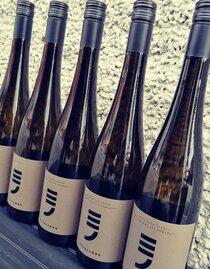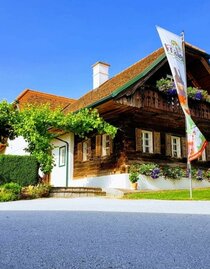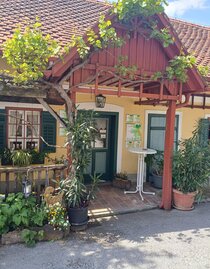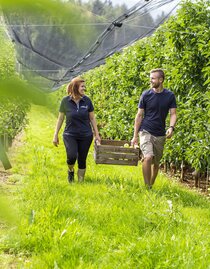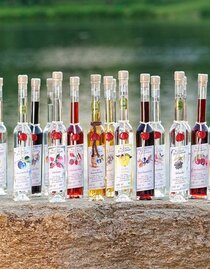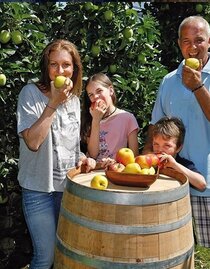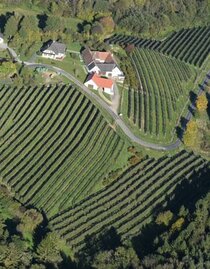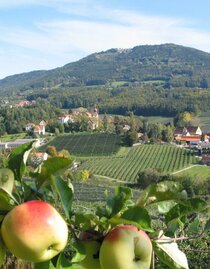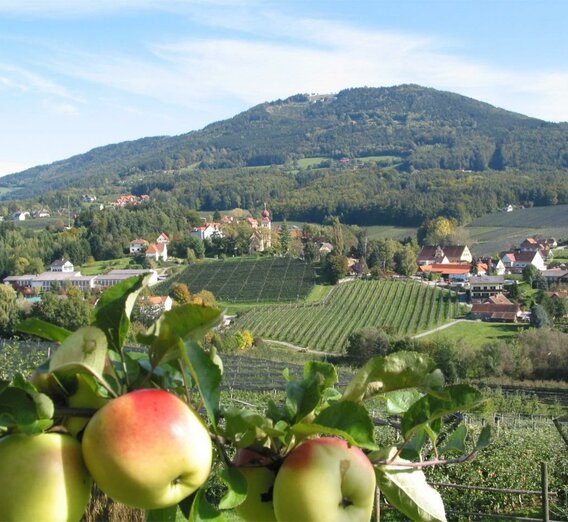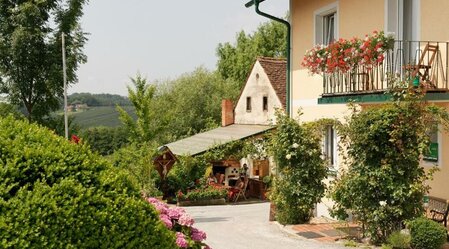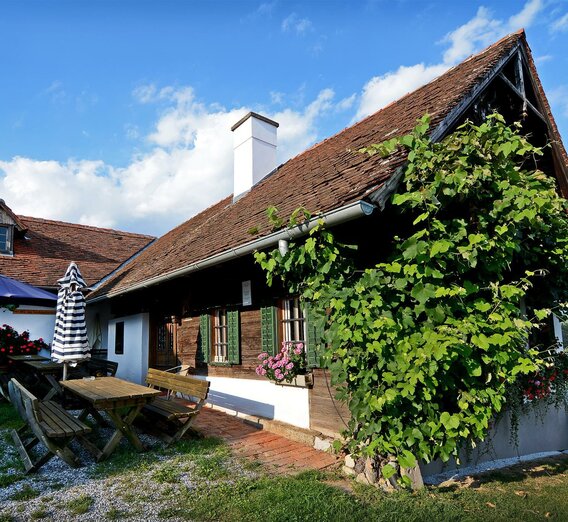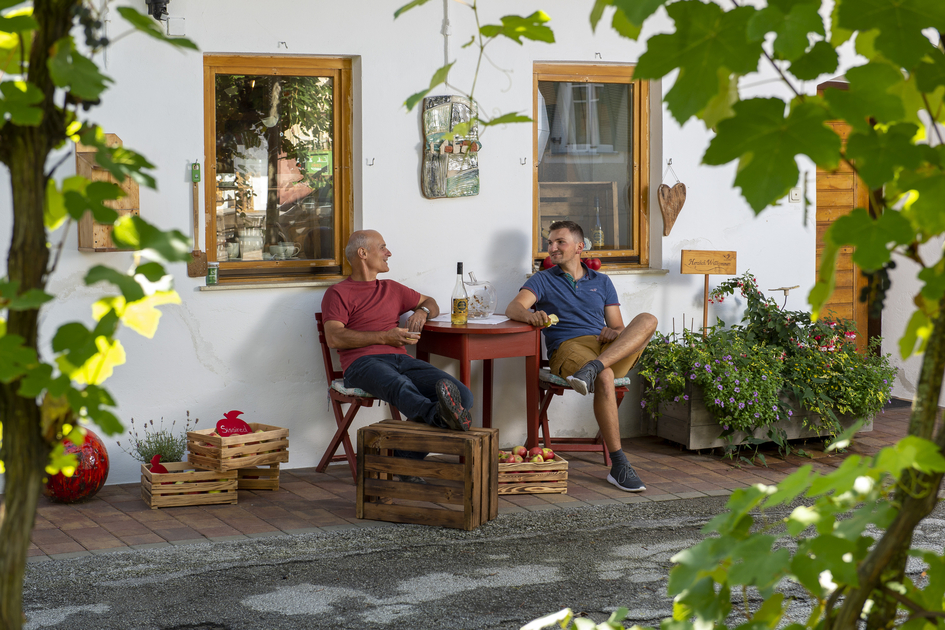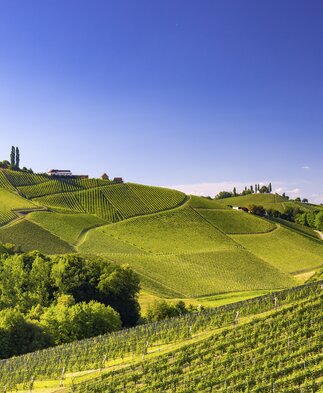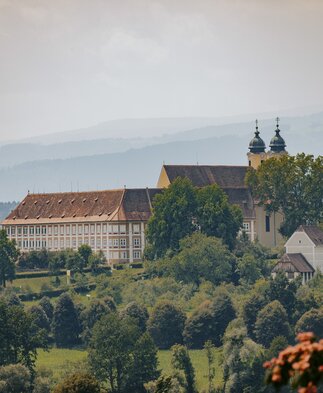

Styria and apples
If you have ever tasted an apple from Styria, you know that they are firm and gloriously juicy. The paradisical fruit can also be intense, spicy, tangy or sweet – a truly varied fruit! However, one thing always remains the same: the fact that apples contain a multitude of vitamins.
“An apple a day keeps the doctor away” – but there are many more reasons why Styrians love their apples. And once you have tasted one of the delicious fruits yourself, you will understand why. Styria boasts Austria’s largest apple-growing region with a total area of 4,790 hectares. Every year, Styrian orchards produce about 110,000 - 150.000 tons of apples, with varieties ranging from tangy to sweet and fruity.
Plenty of sunshine in the summer and considerable day/night temperature differences during autumn: The climate of East Styria is particularly beneficial to apples. It gives them their distinctive taste, their intense colour and an even sugar-acid balance.
Styrian apple varieties
Apples are the favourite fruit of Austrians – and its main supplier is the Styrian Apple Road. If you would line up the apples harvested in the apple-growing region of East Styria, it would cover the distance from Puch bei Weiz to Beijing.
The best thing about apples is that you can always discover a new side to them. For instance, Styrian apples can be used for various purposes:
- Bohnapfel: tart, slightly bitter tannin flavor and only slightly pronounced aroma, extremely good storage life, often used as a cooking apple or for cider and brandies
- Bonita: pleasantly juicy, sufficiently sweet with a distinctly tart note, well suited for organic cultivation
- Braeburn: tender and sweet, for hearty snacks and fruity fruit salads, also harmonizes with strong cheeses, also popular as juice, cider or brandy
- Elise: grows medium to large and has a yellow-white and firm flesh, characterized by a good, intense and slightly sour aroma. The riper the apple is, the less tart it becomes, but rather sweet and sour, making it very refreshing. Ideal for baking, cooking and eating raw.
- Elstar: very tangy-fruity taste with a pleasantly tart note, for apple horseradish and hearty fruit salads or with creamy soft cheese, but also ideal for apple strudel or apple sauce
- Fengapi (Tessa®): Fruit shape is elongated, slightly cylindrical and visually very appealing, sweet taste with a low acidity, very good shelf life
- Fuji: juicy, sweet and low acidity, good shelf life, ideal for roasting and stewing, but also for compotes and jellies, ideal for apple strudel
- Gala: aromatic-sweet with low acidity, becomes somewhat bland and mealy if not stored properly, for glazed apples and baking, but also ideal as a sweet baked apple
- Golden Delicious: mildly sweet flavour with low acidity, perfect storage properties, for baking and desserts such as apple tiramisu or apple strudel, harmonizes perfectly with blue cheese
- Gravensteiner: old variety, sweet and sour with a strong spiciness, short shelf life
- Idared: mild and moderately sweet with a pleasantly tart note, mainly a dessert apple, but also good for baking and baked apples, apple sauce and compote
- Ilzer Rosenapfel: dates back to 1840, sweet and sour, harmonious taste, often used for juices and cider
- Jonagold: rather large fruit, sweet and aromatic with delicate acidity, very good storage life, for baking, fruit salads, compotes, chutneys and freshly squeezed juices
- Kronprinz Rudolf: the classic, ideal for apple strudel and apple sauce, but also for a hearty snack
- McIntosh: old variety with moderate firmness and a sweet and sour, refreshing taste, not suitable for longer storage
- Minneiska (Sweetango®): intense red color, very juicy and particularly crunchy, unsurpassed in the segment of early ripening apple varieties, very good shelf life
- Natyra®: small to medium-sized fruit, excellent sweet-spicy taste, very good shelf life
- Nicoter (Kanzi®) : fairly new apple variety, predominantly sweet with a very pleasant fine acidity
- Pinova (Evelina®): Flesh firm and crisp, the flavor sweet aromatic with moderate juiciness, best when eaten fresh, but also good for compote, chutney or pastries
- Rafzubin/Rubinette: extremely juicy, have a lot of sugar and at the same time an appealing tart flavor, regular winners of awards for juices, musts and brandies
- Scifresh (Jazz™): firm and crisp, moderately juicy and sweet with a slightly sour note
- Steirische Schafnase: originated around 1800, flesh is white and firm at harvest, but quickly becomes soft and mealy in storage, sweet-sour and aromatic
- Styrian Maschanzker: first described in 1877, small, juicy and firm with an intense aroma, often processed into must, juices and brandies
- Topaz: firm-fleshed and relatively young variety, intensely spicy with a sweet and sour aroma, the most important variety in organic farming
Source: Verein Steirischer Erwerbsobstbauern/Obstland Steiermark
Enjoy! Styrian delicacies made from apples
There are many ways to enjoy Styrian apples, whether you consume them on site or take them home as apple-based products.
Cider and must
A savoury snack platter with crusty bread, savoury cheese, homemade spreads and a glass of cider or must – and your day’s perfect! Must is a traditional delicacy produced in the green heart of Austria. The name “must” comes from Latin and means “young wine”. It is served in Styrian restaurants and wine taverns as a traditional refreshment. In addition to the common variety, there are also new, regional apple wine creations that are best enjoyed fresh and cold.
You can enjoy cider and must at most Styrian wine taverns and at select restaurants and bars. They are also often available from farmers’ markets and farm shops.
Fruity specialities served at “apple restaurants”
If you like apples, you will love the Styrian “Apfelwirte” restaurants. Along the 25-kilometer-long Apple Road leading from St. Ruprecht an der Raab to Puch bei Weiz and Anger you can find numerous “apple restaurants” serving delicious apple-based treats.
In addition, the Mürztal mixed fruit region is a great place to enjoy apples. Local restaurants use ancient and wild fruit varieties to create mouth-watering traditional and modern dishes.
